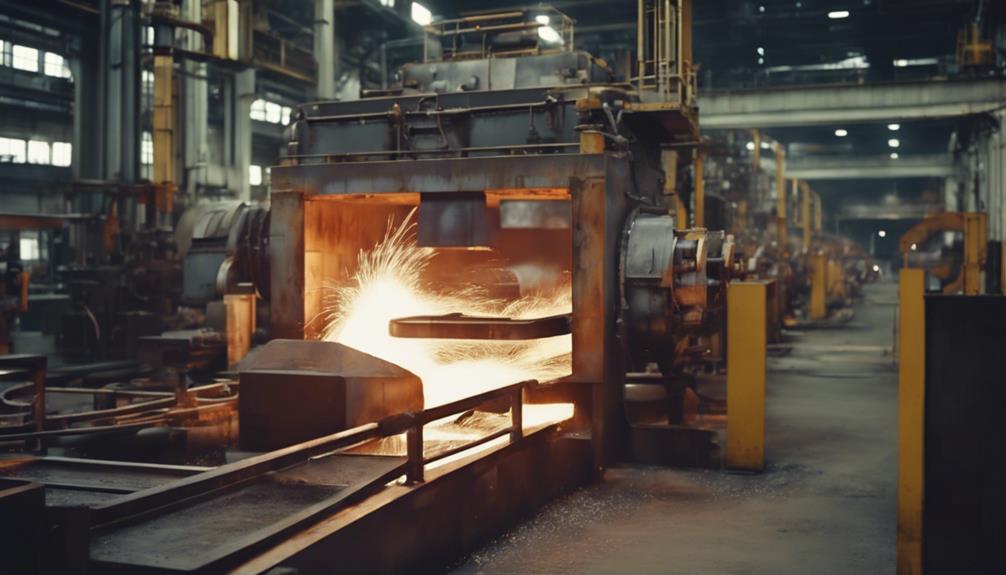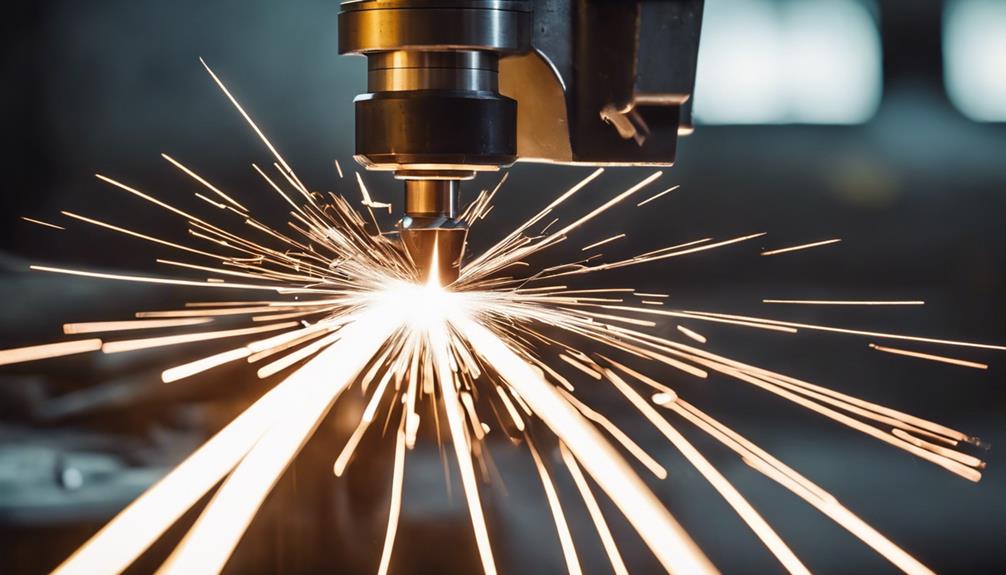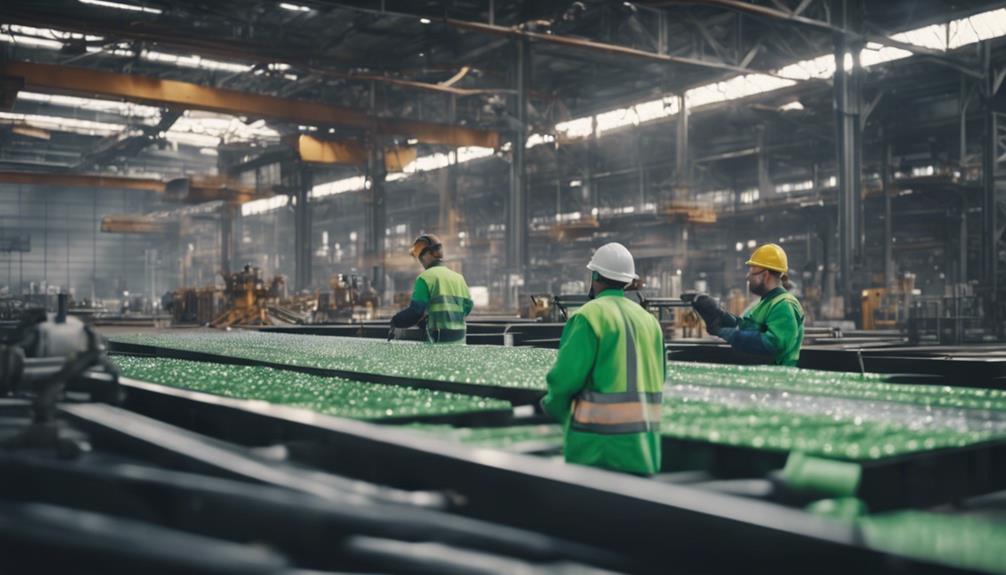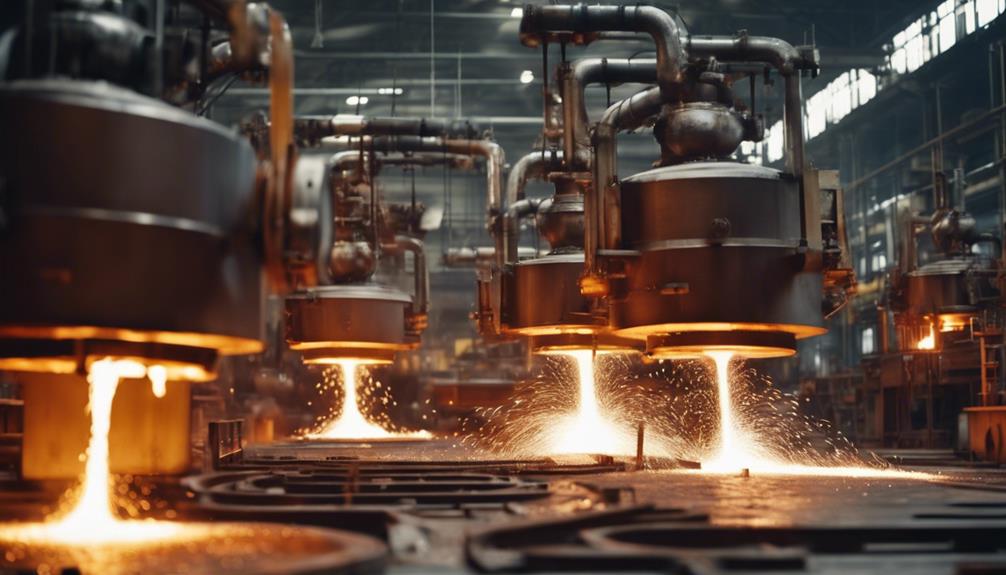Steel product manufacturing is the backbone of various industries, providing essential components for construction, machinery, and transportation sectors. Processes like blast furnaces and electric arc furnaces produce high-quality steel for infrastructure development. Steel’s strength, durability, and customization options make it ideal for machinery manufacturing. In transportation, steel guarantees safety in automotive, railway, aerospace, and shipbuilding applications. Advancements in green steel technology aim to promote sustainability and reduce carbon emissions. Future trends in steel manufacturing focus on innovation, sustainability, and technological advancements to meet industry demands efficiently. Discover more about the critical role of steel in shaping industries.
Key Takeaways
- Steel manufacturing crucial for infrastructure, machinery, transportation
- Steel provides strength, durability, and versatility for various industries
- Green steel technology focuses on sustainability and reducing carbon footprint
- Advancements in steel alloys enhance strength and sustainability
- Future trends include digital twins, Industry 4.0 integration, and sustainable practices
Steel Products Production Process

Steel production processes play a pivotal role in the manufacturing industry, employing a combination of traditional and modern techniques to convert raw materials into high-quality steel products.
Steel Manufacturing Company
In the domain of steel manufacturing, two primary methods are commonly used: blast furnaces and electric arc furnaces. Blast furnaces are integral in the initial stages of steel production, where they convert iron ore into molten iron. This molten iron is then further refined into steel through various processes. On the other hand, electric arc furnaces have gained prominence for their ability to melt scrap steel using electricity, resulting in the production of new steel products in a more energy-efficient manner.
Additionally, continuous casting processes are employed to shape the molten steel into various forms such as slabs, billets, or blooms. These processes are meticulously controlled to regulate factors like temperature, composition, and casting methods, ensuring the quality and consistency of the final steel products.
The combination of these traditional and modern techniques in steel manufacturing is vital for meeting the diverse demands of industries and maintaining high standards of product quality.
Importance of Steel in Infrastructure
Playing an essential role in the development of infrastructure, steel emerges as a foundational material supporting the construction of bridges, highways, and buildings. Steel’s significance lies in its strength, durability, and versatility, making it an ideal choice for structural components in various infrastructure projects.
Steel manufacturing companies play an important role in providing the necessary materials for these developments. The ability to customize steel to meet specific infrastructure requirements guarantees that projects are not only structurally sound but also safe and long-lasting. Additionally, steel’s corrosion resistance properties shield infrastructure from environmental factors, thereby increasing its lifespan and reducing maintenance costs.
Role of Steel in Machinery Manufacturing

With its indispensable role in infrastructure firmly established, the significance of steel extends seamlessly into machinery manufacturing, where it serves as a foundational material for ensuring the strength and durability of critical components.
Steel is a fundamental element in the production of machinery, providing the necessary strength and durability for various components such as gears, shafts, and heavy equipment. The reliability and structural integrity of these machinery parts heavily depend on the use of steel.
One of the key advantages of steel in machinery manufacturing is its versatility, allowing for customization to meet specific requirements and ensure peak performance. Additionally, the cost-effectiveness of steel contributes to lower maintenance costs and extends the lifespan of machinery products.
Steel’s resistance to corrosion and high structural integrity make it an ideal choice for critical applications in machinery manufacturing, where reliability and performance are paramount. The use of steel in machinery manufacturing plays an essential role in guaranteeing the efficiency and longevity of industrial equipment.
Impact of Steel in Transportation Equipment Manufacturing
Steel’s pivotal role in the domain of transportation equipment underscores its unmatched strength and durability in ensuring the safety and reliability of various modes of conveyance.
In the automotive industry, where over 50% of vehicles’ weight comprises steel components, high-strength steel is extensively used to enhance safety and structural integrity in vehicle frames and body panels.
Steel’s impact also resonates in railways, playing an essential role in the construction of tracks, bridges, and train compartments, ensuring the smooth operation of train services.
In addition, in the aerospace sector, steel is indispensable for critical components such as landing gear, engine parts, and structural elements due to its exceptional strength and durability, contributing to the safety of air travel.
Additionally, steel’s presence in shipbuilding guarantees the reliability and longevity of various maritime vessels, ranging from cargo ships to luxurious cruise liners.
The utilization of steel in transportation equipment underscores its significance in maintaining the efficiency and safety standards of different modes of transport, making it an indispensable material in this industry.
To meet the growing demands, advancements in steel manufacturing factories continue to enhance the quality and performance of steel for transportation applications.
Advancements in Green Steel Technology

The evolution of green steel technology signifies a significant shift towards environmentally sustainable practices in the steel manufacturing industry. Green steel technology focuses on reducing the environmental impact of steel production through sustainable practices and processes.
Advancements in this field include using renewable energy sources, recycling scrap steel, and minimizing carbon emissions. These innovations aim to meet global sustainability goals and reduce the industry’s carbon footprint. Green steel production methods prioritize energy efficiency, waste reduction, and lower greenhouse gas emissions.
The development of green steel technology is essential for creating a more environmentally friendly and sustainable steel industry. By embracing green steel technology, manufacturers can contribute to a cleaner and greener future while meeting the increasing demand for sustainable steel products.
As the industry continues to evolve, the integration of green steel practices will play a vital role in shaping a more eco-conscious steel manufacturing sector.
Future Trends in Steel Manufacturing
Future trends in the manufacturing of steel are increasingly centered around sustainable practices and technological advancements to minimize environmental impact and enhance efficiency.
Green steel production methods are being prioritized to reduce the carbon footprint of steel manufacturing processes.
The adoption of digital twins and simulation technology allows for real-time monitoring and analysis, leading to more informed decision-making in steel production.
Industry 4.0 technologies such as automation, data analytics, and the Internet of Things (IoT) are being integrated to optimize steel manufacturing processes further.
Vital steel technology plays a significant role in structural health monitoring and integrity assessment within the industry, ensuring safety and quality standards are met.
Additionally, ongoing innovations in steel alloys are resulting in materials with exceptional properties like increased strength and corrosion resistance, shaping the future of steel manufacturing towards more durable and sustainable solutions.
These advancements demonstrate the industry’s commitment to embracing cutting-edge technologies for a more efficient and environmentally conscious approach to steel production.
Frequently Asked Questions on Steel Products Manufacturing
What is the Backbone of Steel Industry?
The backbone of the steel industry lies in its fundamental role as a provider of strength, durability, and versatility to various sectors. Steel’s essential properties support infrastructure, construction, and manufacturing, making it indispensable for modern civilization’s development and growth.
Why is the Steel Industry Important?
The steel industry is essential due to its fundamental role in infrastructure, construction, and manufacturing sectors. Steel is vital for building structures, machinery, and transportation, contributing greatly to economic development and industrial progress globally.
Why is Iron Ore Called the Backbone of Industrial Development?
Iron ore is referred to as the backbone of industrial development due to its critical role as a primary raw material for steel production, which is essential for construction, manufacturing, and infrastructure projects worldwide.
What are Key Success Factors in the Steel Industry?
Key success factors in the steel industry include technological advancements, innovation in production processes and materials, adaptation to global trends like sustainability and digital transformation, a skilled workforce for new technologies, and compliance with environmental regulations for competitiveness.
Conclusion
To sum up, steel product manufacturing plays a vital role in the backbone of various industries, including infrastructure, machinery manufacturing, and transportation equipment.
With advancements in green steel technology, the industry is moving towards more sustainable practices. Future trends in steel manufacturing are expected to focus on efficiency, innovation, and meeting the growing demands of a rapidly evolving market.
Steel will continue to be a key component in driving growth and development across various sectors.

